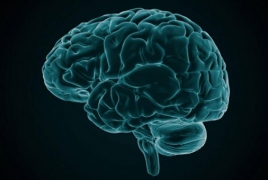New study reveals how stress changes the brain July 26, 2019 - 17:38 AMT PanARMENIAN.Net - The results of a new brain imaging study may have just answered a big question about how stress changes the brain. Using a combination of genetic editing and brain scanning in mice, researchers found that stress triggers a chemical cascade that radically changes how brain networks communicate, and the results could sharpen our understanding of anxiety disorders in humans, Forbes reports. Stress serves an important purpose in preparing us to react to danger. Anything the brain perceives as threatening triggers multiple brain networks to synchronize and communicate, all in just a fraction of a second. With systems humming, we make immediate decisions to survive the threat. But what facilitates all of those brain networks to connect and communicate? That’s been a difficult question to answer in the human brain, because doing so would require examining brain function during the split-second window of facing a threat. Enter our friends the mice to help solve the problem. Researchers followed a trail of previous studies and zeroed in on the neurotransmitter noradrenaline (aka norepinephrine, a chemical that floods the brain during stress) as a likely facilitator of brain-network connectivity. The twist was that they had genetically edited the rodents’ brains to allow for selectively controlling when noradrenaline was released (not possible in human brains). While controlling the chemical faucet, they also scanned the mouse brains using fMRI to see what would happen. And what happened, it turns out, was pretty amazing. The release of noradrenaline “rewired” the mouse brains, allowing different brain networks to instantly cross-communicate. But the neurotransmitter wasn’t just facilitating communication, it was restructuring neural connections beyond anyone’s expectations. “I couldn’t believe that we were seeing such strong effects,” said the study’s first author Valerio Zerbi, a brain imaging specialist from the University of Zurich. The researchers found the strongest rewired effects in brain areas responsible for processing sensory stimuli (auditory and visual, for example), and in the amygdala, the epicenter of the brain’s threat response system. Authorities said a total of 192 Azerbaijani troops were killed and 511 were wounded during Azerbaijan’s offensive. In 2023, the Azerbaijani government will increase the country’s defense budget by more than 1.1 billion manats ($650 million). The bill, published on Monday, is designed to "eliminate the shortcomings of an unreasonably broad interpretation of the key concept of "compatriot". The earthquake caused a temporary blackout, damaged many buildings and closed a number of rural roads. Partner news |